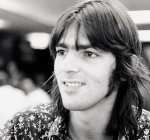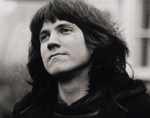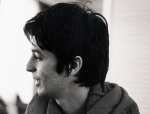 Their craft, though, they
took seriously. Hitchcock "already knew how to play when punk came
along and so did the band, so it wasn't relevant to us. Hence our
lack of success."
Their craft, though, they
took seriously. Hitchcock "already knew how to play when punk came
along and so did the band, so it wasn't relevant to us. Hence our
lack of success."
They regularly spent
half the week rehearsing in a Cambridge home. When an elderly neighbor
complained about the noise Hitchcock wrote "Vyrna Knowl Is A Headbanger"
about her, then changed all the words so he wouldn't be sued, changing
her name to "Vyrna Knowl" not seeming sufficient. ("Vyrna"'s Siamese
twin "Wading Through A Ventilator" turned up on Rykodisc's compilation
The Soft Boys 1976–1981). Andy Metcalfe worked
out the intricate four- and five- part vocal harmonies – they're
most in evidence on Live At The Portland Arms, if you
can find it.
 Metcalfe finally
tired of being smothered by howling guitars and left to join Telephone
Bill and the Smooth Operators. (Gerry Hale, the Operators' violinist,
plays on "Insanely Jealous"). He was replaced by Matthew Seligman,
who'd been in every band in Cambridge, including the early Dennis
and the Experts.
Metcalfe finally
tired of being smothered by howling guitars and left to join Telephone
Bill and the Smooth Operators. (Gerry Hale, the Operators' violinist,
plays on "Insanely Jealous"). He was replaced by Matthew Seligman,
who'd been in every band in Cambridge, including the early Dennis
and the Experts.
"After Andy left I was
getting much more concerned with songs," explains Hitchcock. "There
was coherence of approach because Kimberley was more interested
in the pop side (and so was Matthew) – towards things like
'Queen of Eyes'. But there was a legacy of doing funny stuff in
funny time signatures. So the short list for Underwater Moonlight
was weird because there was material like 'Alien', 'Old Pervert'
(which did make it on there.)" ('Alien' is included on the ...
And How It Got There disk of Matador's Underwater Moonlight
reissue.)
"You have to think about
dramatics. It's good to have a song which maybe would last five
minutes and have crests and waves rather than cucumber, saucepan,
traffic signal, gods, worms - we're back here and nothing has happened.
That's the weakness of bombardment. You do have to come up and go
down."
 When the band was ready
to record Moonlight in 1980, they couldn't afford the
expensive production that was in fashion. This was a group that
slept in one room when they were on tour, heads next to feet "because
that's what boys do", says Seligman. The album was recorded for
£600 (a bit over $2000 in US Y2K dollars).
When the band was ready
to record Moonlight in 1980, they couldn't afford the
expensive production that was in fashion. This was a group that
slept in one room when they were on tour, heads next to feet "because
that's what boys do", says Seligman. The album was recorded for
£600 (a bit over $2000 in US Y2K dollars).
"The first tracks were
recorded in the 4-track at Pat Collier's rehearsal studio which
was built into a railway arch and is right opposite Waterloo Station,"
says Seligman. "It was something like £150 to do 'I Wanna Destroy
You' and 'Queen Of Eyes' and maybe 'Strange' and 'Vegetable Man'."
("Destroy" and a different recording of "Queen" made the album;
"Strange" and "Vegetable Man" appear in the outtakes section of
the Matador re-issue.) "Then we got a budget from Armageddon Records
and decided to finish it off at an 8-track studio built in James
Morgan's living room in a house in Earlsfield ... I remember we
re-recorded 'Queen Of Eyes' there. Generally we recorded a song
in about a day because it didn't take long and all the instruments
like guitars, bass and drums would tend to go down at the same time
with vocals going on afterwards. The record is therefore not a lot
different from how we sounded live at the time as we didn't tend
to do many overdubs of extra parts. Obviously the sitar and violin
and the people talking backwards were overdubs, but not much else
... and it was that cheap because it was that simple."
 The Soft Boys
toured to support the album, even coming to the US for the first
time, but nothing came of it. Six months after the album came out
they played their last gig.
The Soft Boys
toured to support the album, even coming to the US for the first
time, but nothing came of it. Six months after the album came out
they played their last gig.
Says Hitchcock: "We never
had very big audiences, and so that night the audience was an Australian
guy, who came up afterwards and said 'That was short.' I said 'yeah,
did you enjoy it?' and he said 'Well no, not particularly, but it
wasn't very long.' And that summed up the Soft Boys' career, really."
